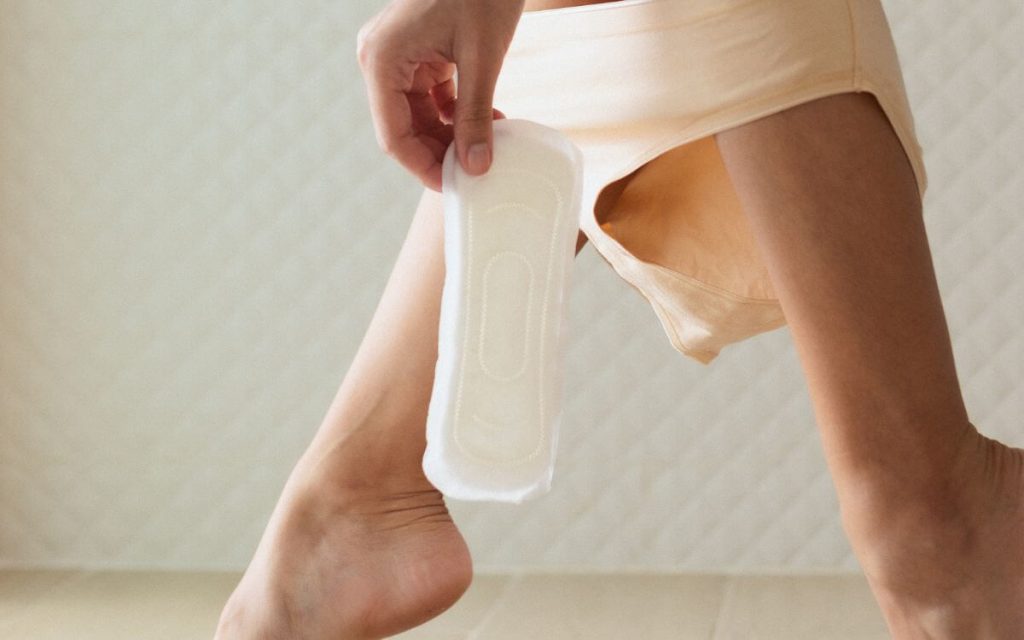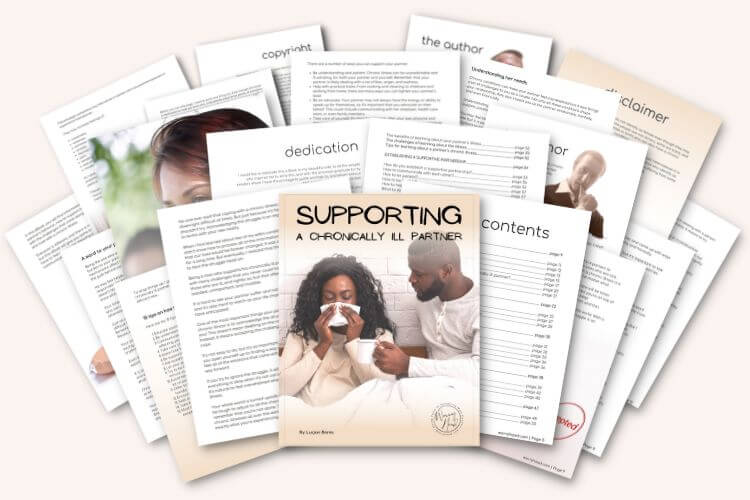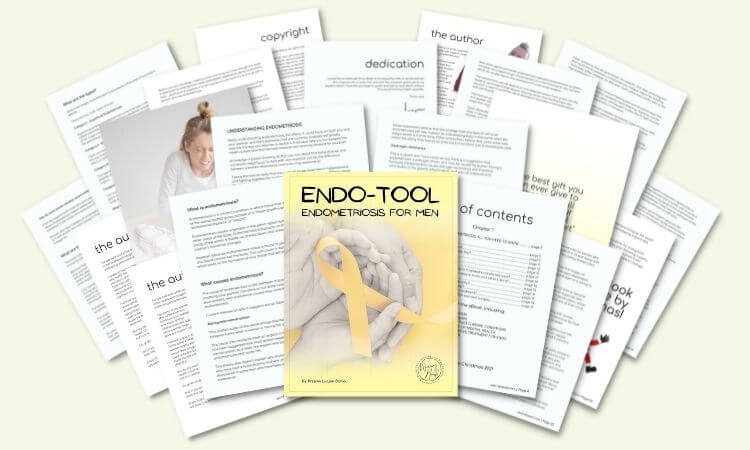Endometriosis for healthy partners: 17 helpful tips.
When endometriosis invaded our marriage, as the husband, I felt really helpless. My wife’s health became my responsibility and I wanted to do whatever I could to help her. This is when I decided to start this very health blog and soon I wrote an eBook about endometriosis for healthy partners called “Endo-Tool: Endometriosis for Men”.
Before that, this was a completely new territory for me – one that made me feel scared, confused, and frustrated.
I soon realized there were many things I could do to be an effective partner in helping manage my wife’s endometriosis. Over time, I learned how to provide practical support and emotional understanding.
Endometriosis guide for men.
There are two important questions you need to know the answers to in order to find a way how to cope with the new normal of endometriosis. These questions are:
- What are the challenges for women?
- How does endometriosis affect healthy partners?
By answering them, you can learn how endometriosis affects your relationship and what you need to do in order to provide the best support for your partner.
Before I answer those questions, we need to discuss the basics first:
- What is endometriosis?
- How endometriosis occurs?
- What is the treatment?
What is endometriosis?
Endometriosis is a condition in which the tissue that is similar to one that normally lines the uterus grows outside of it. This tissue can attach to other organs and cause pain, irregular bleeding, and other symptoms.
How endometriosis occurs?
Endometriosis occurs when tissue that is normally found in the uterus, called endometrium, migrates to other parts of the body. This can happen as a result of retrograde menstruation (when some menstrual tissue flows backward through the fallopian tubes instead of out of the body) or surgical procedures.
What is the treatment?
The primary goal of endometriosis treatment is to reduce pain and improve quality of life. The most common approach includes a combination of pain management medications, hormone therapy, or laparoscopic surgery.
What are the challenges for women?
Women living with endometriosis often experience chronic pain, discomfort, and fatigue. This can cause a significant disruption of daily activities and make it difficult to manage relationships, work responsibilities, and other aspects of life.
The most common symptoms of endometriosis are pelvic pain, painful periods, and difficulty getting pregnant. Other symptoms can include fatigue, digestive issues, and mood swings.
These symptoms can make a woman feel helpless and frustrated, as well as isolated from her partner. Women are impacted physically, emotionally, psychologically, mentally, socially, and financially.
- Physically, women may experience pain, discomfort, and fatigue.
- Emotionally, women may feel overwhelmed and frustrated.
- Psychologically, women may experience anxiety and depression due to the uncertainty of endometriosis and its symptoms.
- Mentally, women can struggle with learning how to manage their condition on a daily basis.
- Socially, endometriosis can have an effect on relationships as well as activities outside the home such as work or school.
- Financially, endometriosis can cause financial strain from medical appointments, medications, treatments, and lost income due to missed days at work.

How does endometriosis affect healthy partners?
There are plenty of challenges women with endometriosis face, from chronic pain to infertility. However, there are also difficulties that affect their healthy partners.
For example, it can be difficult for men to fully understand the symptoms and implications of endometriosis since they do not experience them directly. It is important for men to become informed about endometriosis in order to provide effective support and understanding.
Endometriosis can have a big impact on a couple’s relationship and quality of life. The partner may feel powerless when it comes to helping or supporting the other person with endometriosis, as well as feeling frustrated by the lack of control over their situation.
Additionally, endometriosis can lead to depression and other mental health issues for both partners.
In order to lessen the burden of endometriosis on a couple’s relationship, it is important for healthy partners to become informed about endometriosis, provide support and understanding, and learn ways to manage stress and anxiety.
The impact of endometriosis on healthy partners can range from feeling confused or helpless to feeling frustrated or overwhelmed. Partners may feel like they do not know how to help their partner manage the condition or provide the necessary emotional support.
It is important to remember that there are many things healthy partners can do to be supportive – both practically and emotionally.
What can men do?
Endometriosis can be a difficult and challenging condition for women, but the challenges don’t stop there. Men who are in relationships with women suffering from endometriosis often struggle to understand how best to offer support.
Unfortunately, men can sometimes feel helpless and overwhelmed by the situation, especially if they don’t understand the signs and symptoms of endometriosis.
Men can play an important role in helping their partners manage endometriosis. In the following paragraphs, I give you some ways that men can help women cope with this condition…
If you want more in-depth information about how to support your partner with her chronic conditions and how to cope with the new normal in your relationship, I wrote a “Supporting a Chronically Ill Partner” e-Book.
You can get the 1st Chapter of the e-Book for FREE, and if you like it, you’ll get a Whopping 33% Discount on the Whole Book, plus discounts on other helpful tools. You have nothing to lose but a lot to gain!
The first chapter alone contains a lot of information for both of you about acknowledging the struggles, including:
- A word to your partner.
- A word to you.
- Stepping on eggshells.
- Understanding her needs.
- How to acknowledge having a chronically ill partner?
- Acknowledging can be hard.
- 15 tips on how to do it!
Get the 1st Chapter FREE!
Chronic Illness for Partners

17 tips on endometriosis for healthy partners.
If you are the healthy partner of someone who suffers from endometriosis, I wanted to share with you my 17 tips on how you can best support your loved one:
1. Educate yourself about endometriosis. The more you understand the disease, the better able you will be to listen and provide support.
2. Understand that endometriosis affects every woman differently so try to be open-minded toward your partner’s individual needs and experiences with this condition.
3. Pay attention to her symptoms and help her make note of any patterns or triggers that could possibly lead to flares or pain spikes.
4. Offer emotional support during tough times and be patient if she needs extra time for painful days.
5. Help her find ways to cope with endometriosis, such as yoga, massage, acupuncture, etc., which can greatly improve her quality of life when dealing with chronic pain from this condition.
6. Lend a listening ear and provide a safe space for her to talk about endometriosis without judgment or criticism.
7. Respect her decisions when it comes to treatment options, even if you don’t fully understand why she chose one path over the other.
8. Encourage her to join support groups or forums so that she can connect with others who are dealing with similar issues as her own.
9. Spend quality time together doing activities that bring joy into your life, such as going out on walks, taking classes, etc., which will help reduce stress levels and boost endorphins in the body – reducing pain associated with this condition.
10. Offer practical assistance whenever possible: cook meals, help clean the house, run errands, and take care of any other daily tasks that can be a burden during times of endometriosis flares.
11. Help her to practice self-care by allowing her to take time for herself when she needs it in order to recharge and restore balance in her life.
12. Don’t forget about your own mental health: know that it is okay to seek out support from family or friends if you are feeling overwhelmed.
13. Make sure she knows how much you love and appreciate her by telling her every day – no matter what!
14. If surgery is required, provide emotional and practical assistance throughout the recovery process (and don’t forget to take care of yourself too).
15. Be a part of her medical journey: encourage her to keep up with doctor’s appointments, fill prescriptions and follow through with suggested treatment plans.
16. Always be willing to talk – no matter how long it takes or how many times you have to revisit the same conversation.
17. Remain optimistic! Endometriosis is a challenging condition but there is still hope for improvements in quality of life when effective treatments are found.
By following these tips, I am confident that you and your partner will be able to build a partnership centered around helping each other manage endometriosis together!
If you aren’t sure about buying my book straight from the shop, and you want to learn more about endometriosis, you can get the 1st Chapter of the e-Book for FREE, and if you like it, you’ll get a Whopping 33% Discount on the Whole Book, plus discounts on other helpful tools. You have nothing to lose but a lot to gain!
The first chapter alone contains all the comprehensive medical knowledge about endometriosis, including:
- What is endometriosis?
- What are the symptoms?
- What causes endometriosis?
- What does endometriosis look like?
- What are the stages?
- What are the types?
- What is adenomyosis and how is it related to endometriosis?
- Why do some women develop severe endo and others don’t?
- Does endometriosis cause infertility?
- How is endometriosis diagnosed?
- Do types and stages affect the treatment?
- Recurrence of endometriosis after excision surgery.
FREE Chapter of “Endo-Tool”
Endometriosis e-Book for Men

A final word on endometriosis for healthy partners.
Endometriosis is a challenging condition and it can be difficult for the healthy partner to understand how their spouse is feeling.
Remember that learning about endometriosis and educating yourself on how best to support your loved one will only help strengthen your relationship in the long run. Take this endometriosis guide for men as an example of how you can best provide emotional, physical, and practical assistance during times of need.
With love and patience, you both can overcome anything!
Good luck!


About Me
Hi, I’m Lucjan! The reason why I decided to create this blog was my beautiful wife, who experienced a lot of pain in life, but also the lack of information about endometriosis and fibromyalgia for men…
